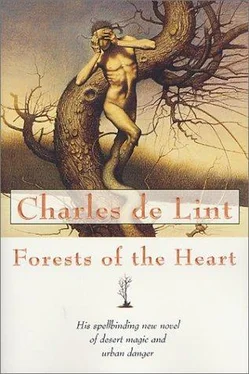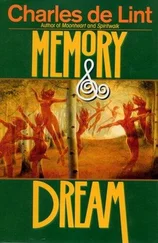No, just Hunter and whoever else came in their way. She’d been young when she’d had to sit there and listen to Fergus and his cronies go on with their hateful talk, voicing all their petty revenges and lusts with no thought of the children—her brother and herself—sitting there listening to them. But she hadn’t bought into their rationalizations then, and she wasn’t about to do so now.
“It’s not you I’m worried about,” she said. “It’s those you plan to hurt.”
“Jaysus, Mary, and Joseph. I haven’t turned into some monster overnight.”
Miki looked at the painting. On its own, it was a startling image, beautifully rendered, disturbing, but so were many of the images of Christ’s crucifixions that hung in Catholic churches. She knew that. But Donal’s painting spoke to her on a deeper level. It told her just how much her brother had listened to those mad ugly stories of their uncle, how different a man he really was from who she’d thought he was, to ally himself with men who would kill another for the luck it would give them, who would use fear and intimidation to take advantage of a susceptible young woman.
It was the symbol of it, that her brother could depict such hurt, that he could consider such hurt…
“Get that thing out of here,” she told him. “And take yourself with it.”
“Miki—”
“Go and live in the wilds with your Gentry. Bugger yourselves, for all I care. But don’t be back here. And don’t even consider hurting any of my friends again. They’re under my protection—do you hear me? Go and tell your hard men that, and if they have a problem with that, they can come see me about it.”
“It’s not like you’re thinking,” Donal told her. “They’re just looking for a home. For someplace they can call their own.”
“And if it already belongs to someone else?”
Donal shook his head. “These aren’t human men we’re talking about. They’ll take nothing from us.”
“Then who will they be taking it from?”
“Jaysus, that’s so like you. Why do you have to think anything’ll be taken from anybody?”
“Because that’s what their kind do, Donal. They take from others—and do you know why? Because it tastes sweeter to them when it’s bathed in another’s hurt. That’s who you’ve allied yourself with.”
“Now you’re talking mad.”
“Am I? Why don’t you ask your hard men yourself? Better yet, why don’t you stand in their way and see how well you remain friends.”
“Miki…”
She shook her head. “It goes, and so do you.”
Donal nodded slowly.
“Fine,” he said.
The look in his eyes broke Miki’s heart all over again. Standing up, he put his foot through the painting, then grabbed the torn edges of the canvas and tore it in half. The sound of the canvas ripping felt like pieces of Miki’s soul being torn from her.
“There,” he added. “That make you feel better?”
Miki took a deep, steadying breath. She faced his glare with a firmness she didn’t feel.
“If only you could tear it out of yourself as easily,” she said after a long moment.
“Jaysus woman. I was doing this for us.”
“For us ?”
“Who else?” Donal demanded. He softened his voice. “Do you never get tired of scrabbling for every penny?” he asked her. “Did you never want that one sweet chance to strike back at all those who spat and shat on us every chance they could?”
Miki shook her head. “That’s not what it’s about,” she said. “And we both know it. It’s you being himself—our father. Or Fergus. It’s you being the big man.”
“If you really believe that…”
“What else am I supposed to believe?” she asked. “If you want to be something, why don’t you be a real man for once in your life? Admit that what you’re doing is wrong. That the hard men are no more than a band of thugs who care only for themselves.”
Donal gave her a grim look. He made a fist and smacked it against his breast.
“Here beats an Irish heart,” he told her, the softness left his voice again. “I’ll not bow down to any man—neither here nor at home.”
“At home? Ireland’s not our home and you and your hard men are no more Irish patriots than some IRA bomber, taking the war to the innocent.”
“Fuck the IRA,” Donal said. “And fuck the Provos, too. This is an older struggle.”
Miki nodded. “Oh, aye. Between the mad and the sane.”
He took a step to her, still the stranger, and once again she gave him a shove. But their argument had sobered him up some and this time he didn’t lose his balance. For a moment, she thought he was going to strike her, but then he lowered his fist and sadly shook his head.
“You’re blind, is all,” he said. “I’ll forgive you that.”
When he moved forward, Miki stepped back into the hall, but he wasn’t coming after her. He walked down the hall and picked up his parka from the floor.
“You’ll forgive me?” Miki cried.
Donal nodded. He put on his boots. Taking out his key ring, he took off the key to the apartment door and tossed it onto the sofa.
“This is how you get a home,” Miki told him, making a motion with her hand to take in the apartment. “You work for your money—earn it honestly. You pay your rent, or you buy a home. You fill it with things that mean something to you and you welcome your friends into it. It’s not something you can simply take from a person.”
“Oh, no? And those who took our home from us?”
“When you take a home, it’s not a home anymore, is it?”
“It’s whatever you make it to be,” Donal told her.
Then he stepped out of the apartment, closing the door softly behind him.
Miki stared at the closed door. The enormity of what this argument had wrought settled inside her with a deep, sorrowful hurt. Her eyes filled with tears and she made no move to wipe them away as they ran down her cheeks. She made no sound either, as she wept.
Oh, Donal, she thought. Why did you have to listen to them?
She remembered overhearing someone in a pub once, the conversation coming around to the Troubles, saying how when the Irish get hurt, they stay hurt. It was true, too. Donal had never recovered from the pain of their childhood; why else would he have let the hard men take him in the way they had with all their shite of leaf-masked Summer Kings and the need for a home—not one made through love, but taken by pain.
No, Donal had never recovered. She had, but then she’d had Donal to look up at, to depend on. He’d had no one. She’d always thought his morose-ness was only a kind of play; now she knew it was a true, deep melancholy that ran below everything he thought or did. She’d never really understood it until now. But now she knew just how he felt. Now it seemed that all the joy had been sucked out of the world and she couldn’t imagine it ever returning again.
Haz el bien y no veas a quien.
Do good and don’t worry to whom.
—Mexican saying
Sonoran Desert, Spring, 1990
One Friday afternoon in early April, the year Bettina turned sixteen, her grandmother met her as she and Adelita were leaving school. Abuela pulled up at the curb in her dusty pickup and honked to get Bettina’s attention. Beside her, Adelita rolled her eyes and stayed with their friends, but Bettina went running over to the truck. Standing on the running board, she leaned her forearms on the warm metal frame of window and poked her head into the cab.
“Abuela. What are you doing here?”
“We are going on a journey,” her abuela told her.
Читать дальше












